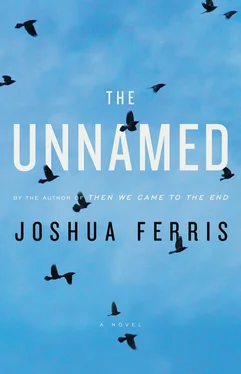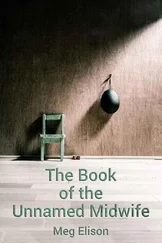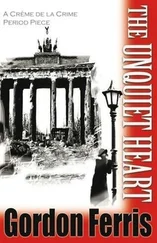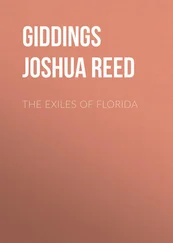He skirted the edge of a copse of trees that had been corralled at their trunks by orange plastic fencing and climbed the bluff that rose over the highway and traversed that weedy expanse that offered no purpose to commerce or settlement but a clear border. When he came down he diverted away from the highway into a neighborhood of half-finished Tudor-style homes on acre plots with dumpsters in the streets full of broken Sheetrock and mounds of rose-hued stone gravel in the driveways that with their air of thwarted expectancy accentuated the abandonment of the stillborn development. The freezing rain had soaked through his cornucopia sweatshirt and made it stiff. He was chattering and perspiring and raging like the fierce storm itself at the wrongs he had suffered at the hands of the other. His threats and accusations echoed in the ghost town as the icy pellets rained down white and round as balls of salt and soon he was gone from there, and the rooftops and windows froze over with a second skin of glass, and the trees and shrubbery looked part of some crystal city.
He was under the eaves of the highway oasis when the man with the garbage bag approached. It was a black industrial-strength garbage bag so old that its pale stretch marks had started to give way to holes, especially at the gathered neck, where the man gripped it to carry it over his shoulder. He set it down and then sat next to Tim on the stone bench.
“Why your fingers like that?” asked the man.
Tim was holding his hands in his lap. His curled and rigid fingers faced upward. The blisters had disappeared and much of the surface area had turned a dark purple that faded at the tips to pitch-black. He looked down at them. They resembled a carrion bird’s claws set by rigor mortis.
“He’s a wily cunt.”
“Who? You frien’?”
“He’s no friend of mine.”
“You ain’t got no frien’?”
He shook his head. They sat quietly. “You got the poison?” asked the man.
The question lingered between them.
“The poison?”
The man stared at him. Eventually he nodded.
“You be all right,” said the man, who looked off in the low visibility. People stood at the rear of their cars, filling them up at the Mobil station.
Before he stood again, the man said, “You oughta be thinking about getting yourself over to the shelter clinic on McAdams. Have the volunteer man check you out.”
Out on the old highway a man driving home steered his clattering pickup over to the shoulder. He pulled in twenty yards ahead of Tim and spoke to him through the passenger-side window when he caught up to the truck. The belly-white clouds foretold the coming blizzard.
“You look like you’re hurt,” said the man. “Do you need some help?”
He stopped before the window. He felt the hot blasts from the vents. They stung his benumbed skin and he took a step back.
“You have a bad limp there,” the man continued. “Are you a veteran?”
He didn’t reply.
“I was Third Battalion, Ninth Marines, in the first Gulf War,” said the man. “Now I help run a place, it’s kind of a safe haven for us. We feed everybody, everybody gets a place to sleep.”
“Do you have the poison?”
“The poison?” said the man.
He stared at him through the open window.
“I’ve never heard it referred to that way,” said the man. “I suppose I do, even if they tell me I don’t.”
He opened the car door and stepped inside the truck.
“Will you do me a favor,” the man asked, before he could put the car in drive, “and roll up your window for me?” He did as he was told. The man looked at his clawed grip crudely manning the handle as his stench grew strong in the cab. “Jesus Christ.” The man opened the driver’s-side door and stepped out. “I’m sorry,” he said, with the door hanging open. “I don’t mean to be rude. There’s just a smell.”
“That’s my leg,” he replied. He delicately rolled up his chinos to show the man.
“Hey,” he said. “Hey, you have to get to a hospital.”
He stepped out of the truck just as the man, who quickly began to roll down his window to let the air in before stepping back inside, got behind the wheel again.
“No way,” he said, standing again on the shoulder of the highway. “No hospitals.”
“Hey, I understand,” said the man. “A hospital is not my favorite place, either. But that infection, that could kill you.”
He shut the door. “No hospitals,” he said through the window.
“But you’re in danger.”
“Nobody asked you to stop for me,” he said.
Eventually he made it to the grounds of the local high school where he passed out on the baseball diamond behind home plate. He swooned in and out. He was awake for the first of the snow. He found the strength to remove his clothes so that he sat under the winter sky in nothing but boxer shorts, feeling the evaporating sizzle of the billowing flakes along his fevered body. He was euphoric with the certainty of physical death. The other had gone completely quiet. No more complaints of hunger or the cold. He had no memory of the last time it had managed to keep anything down. He was winning. He had never given much thought to heaven before, but now he was certain it existed. Without God, the body won, and that couldn’t be possible. He was one thing, his body a different thing altogether, and he was willing a separation, in which he went off to eternal repair while it suffered its due fate of rough handling, dirt, and rot.
Then he was made to stand and walk.
As the wind picked up and the snow grew frenzied he entered a small town. He walked barefoot and near-naked on the side of the road, his belly distended and his leg dragging along. No one can see me, no one would stop me, no one could help me anyway. They would just call the ________ but it would be too late. My only regret is ________. She’d have the coffee on. There was a time during my search for a cure when I tried everything to stop walking including giving up ________. The smell filled the ________. I loved to drink a ________ of ________ in the ________, to say ________; to ________ after we’d spent another ________; together. I’d tell her now it’s going okay except for the poison. It’s going okay except for how much I miss her and ________. ________?
________?! I’ve never been a very good ________.
He came up a final hill alongside a street opposite a multilevel parking lot and a courtyard with a fountain and a few other professional buildings. He wondered where he would end up, in what outpost of trees or behind what building, inside what unused doorway or, if he was lucky, what unlocked bathroom or backseat, his final resting place. But then the other let go of its mineral grip and he saw the doors part before him.
He went down on his knees on the rubber mat. “You son of a bitch! You can’t change the rules.”
The nurse saw him and started from behind the station.
“He changed the rules!” he cried, as an emergency crew came forward.
You didn’t really think I would let you kill us, did you?
He was lacking identification and admitted to the ICU under the name Richard Doe. He had renal failure, an enlarged spleen, sepsis-induced hypotension, cellular damage to the heart. He had trench foot and a case of dysentery. He required assisted breathing and intravenous antibiotics. He did not wake day or night.
The other made him say things. “Oof!” was one of them, “aaa, aaa” another. They entered into the type of interminable conversations that often break out in fevered dreams.
Q: What did you do for a living?
A: I was a ________.
Q: “Lawyer”?
A: Yes, that’s it. Is this an interrogation?
Q: A simple word, “lawyer.” Why can’t you remember it?
Читать дальше












